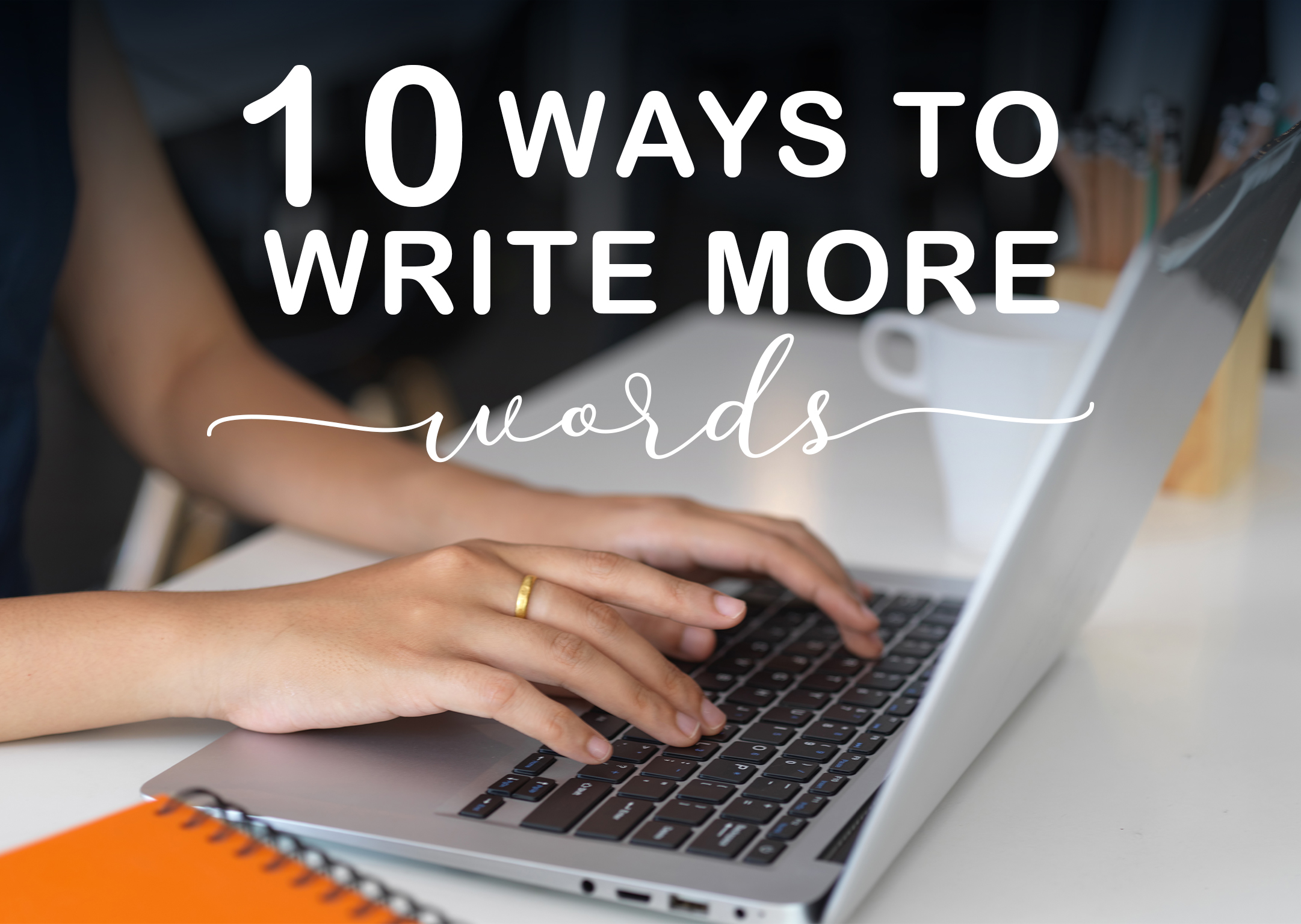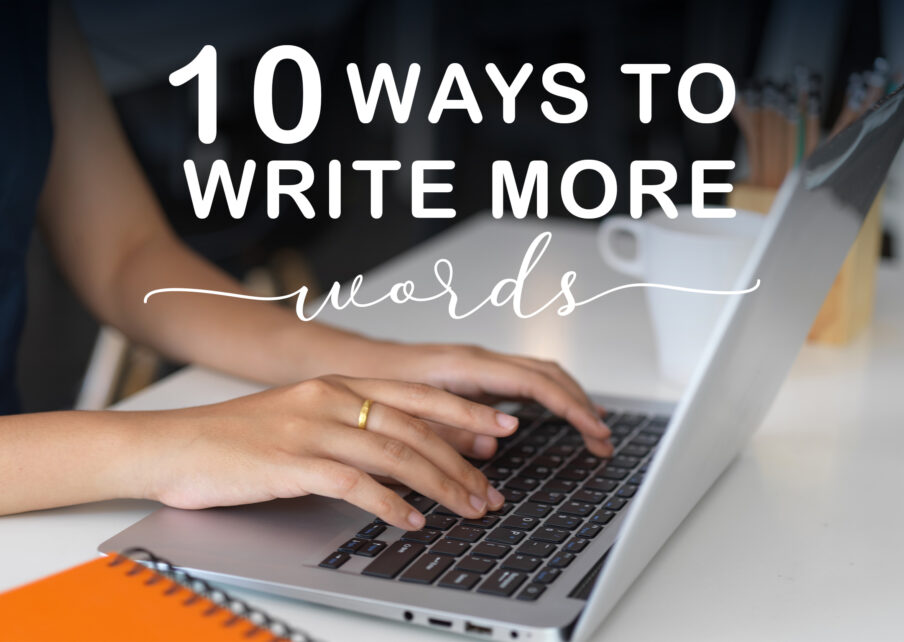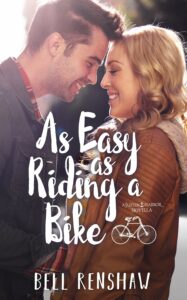By Emilie Haney, @emhaneyauthor

I’ve been a ghostwriter for 10 years now. I do less of it now that I’m working on my own books, but during those years I found many of my days came with seemingly insurmountable word count goals and a definitive lack of motivation. When you’re writing to pay your rent, however, you don’t have the luxury of taking many days off.
I’ve compiled a list of 10 things I do in order to get words on the page. I’m sure you’ve heard some of these, but perhaps some might be new to you.
1. Turn off distractions
This is crucial. No phone, no email, no personal conversations during your writing time if at all possible. If I’m researching I try to keep only that page open and nothing else. For the phone, I use an app that lets you “lock” your phone for a set amount of time (up to 2 hours at a time).
When writing, this depends on what programs you use. In Scriviner it’s “composition mode” which opens your document in full screen with no way to see anything but the writing. In Word I open the document in a full screen and don’t allow myself to navigate away from that.
Why go to all this trouble? Because, as wonderful as technology is, it is also very distracting. Don’t let it take your writing time.
2. Writing Sprints
How I sprint:
- Take away any distractions
- Set a timer – I tend to do 20 min on, 5 minutes off (I use a timer on my computer, but you can also find a helpful Bot in Discord, or even sprint over Zoom with other authors to keep up motivation!)
- Write write write – and do NOT let anything get in the way of this. No research, no people interrupting you, no phone time. Let the words flow (or force them) but keep writing until that timer goes off.
3. Set a timer
Similar to sprints but this option is for setting aside writing time in general. Setting a timer is a mental game and helps you focus for that set amount of time. When we think of writing all day it’s daunting, but thinking of filling 1 hours’ worth of writing time can produce great results and is mentally more “doable”.
4. Re-read first
Go back to what you wrote before and re-read either the whole chapter or scene before starting the new session. Also make sure you know where you’re heading with your writing work for the day. If not, it’s worth it to stop and plan out what you want to write before you start.

5. Voice to text / Recording yourself
There are more advanced ways to do voice to text, but I’m cheap 
Similarly, using a voice recording app (like the free one on most phones) can allow you to verbally process your novel. Whether it’s a scene you’re going through or just plot thoughts – this is very helpful.
6. Use your phone
Similar to #5, using the notes app or similar app for text, type out your novel. You can do this anywhere and then copy and paste into your document.
7. Push through the block
If your lack of words is due to writer’s block, I say push through. Sometimes that looks like using one of these methods, but for me it’s writing a few terrible sentences before the flow starts again.
Tip: If you’re stuck at a scene or an area needing research, use an identifier and move on. I use capitalized text like: FIND BROTHER’S HAIR COLOR. Not terribly advanced but it works. You can also use a signifier unlikely to be used in the text (such as XYLOPHONE) and then search for that to fill in those areas. This is helpful even when skipping whole scenes in order to keep the words flowing!
8. Give yourself permission to free write
Sometimes when writing one thing fails, try writing another. Don’t do this for very long, but allow 10-15 minutes of a new, fresh project to flood your mind. Let creativity seep in and then use that to pivot back to your current WIP.
9. Get up earlier / Stay up later
If you’re struggling to get the words down and that’s due to “life happening” try getting up earlier or staying up later to write. Combining this with either sprints or setting a timer and you’re guaranteed more words.
10. Take a walk
So many times I’ve found my motivation dwindling or a plot point confusing me and no matter how I try to work it out, it won’t budge. Rather than rework it a million times, I get outside and shift my focus to nothing. No audiobook or voice to text. Just me in nature (or the neighborhood) and my thoughts. You’ll be surprised how much your mind works on issues subconsciously.
Let me know in the comments which of these 10 things is new to your and which of them you’ve used in the past!
Emma Holland is almost finished with the renovation of The Brown Bear Lodge nestled just off the Pacific Coast 101 Highway in picturesque Justin Harbor, Oregon. Being a business owner in a small town isn’t easy, but Emma’s got more than enough determination—not to mention an excellent eye for interior design. There’s only one problem. One of her first guests of the season is someone she hoped she’d never see again. As a famous landscape photographer, Connor Pearson has traveled far and wide following his dreams at the cost of losing his first love. Now, back in Justin Harbor, Connor is looking for more than just a place to stay. He’s looking for himself. As Emma and Connor rediscover their lost friendship and seek to find common ground in the present, Connor feels the tug of his small town roots. Is it possible that a man who’s traveled the world could find his home where his dreams began? Can Emma come to terms with the fact that self-reliance isn’t all it’s cracked up to be? Will their bonds from the past weather the storms of the present? As Easy as Riding a Bike will introduce you to the salty air and calming waters of Justin Harbor, the first novella in a series featuring small town women business owners.

Emilie Haney (also writing under the pen name Bell Renshaw) grew up in the Pacific Northwest and has a love for the outdoors that matches her love for the written word. In addition to writing, she is a graphic designer who creates promotional graphics for writers, designs book covers, and has built a thriving community around her Instagram platform and brand CreateExploreRead. Emilie writes YA science fiction and fantasy as well as adult contemporary fiction with strong themes of romance and suspense and believes that–no matter what–love fights for what’s right. Connect with her: www.eahcreative.com, Instagram, Etsy


Comments 1
These were great tips! I shared them with many writers I know.